
|
Jersey. Channel Islands, Great Britain / New Zealand
|
|
About Jersey |
|
Troy family history |
|
My family |
|
Our home |
|
Our horses & animals |
|
Morris Minors & Vmax |
|
E.Troy Ltd |
|
The occupation years |
|
Shuttlers Badminton |
|
Interesting snippets |
|
Contact us |
|
What's New |
|
Links |
|
Guest book comments |


|
My life at Telecoms (joined 5/3/73 ) after being self employed till I was 27 years of age. I had employed six employees and built my own bungalow before I was married. Being married and with our first baby on the way decided I would like a steady job with set hours and applied to Telecoms (had six GCE O levels). Told no vacancies but after six months had a letter stating there was a vacancy in the overhead pole/line section. Went for the interview and got the job (interviewed by Reg Allenet, Bibby Biles and George Le Caudy who asked me to explain Ohm’s Law). Almost had second thoughts as it was a drop in earnings for me but I was prepared to go to night school to hopefully better my position. I loved repairing anything electrical and the job security now I was starting a family clinched it for me.
Joined Jersey Telecom (then the just formed States Telecommunications Board) on the 5th March 1973 as a labourer/adult trainee a month before my 28th birthday. (Nicola was born 15/03/1973 ten days later, no maternity leave in those days). Worked at first mostly at West and East areas as they were still CB (central battery) exchanges with open copper wires and manual operators. Start pay was £24.20 per week for a 52.5 hour week.
Working for the States of Jersey Telecommunications Board in 1973 was a totally new way of working and took some getting used to after being self employed. An example of what I mean is the time I was in the stores and an engineer dropped a full packet of screws on the floor, I immediately began picking them up and he said “Hey what are you doing”. With that he picked up a broom, swept them to the corner and with a dustpan placed them in the bin, then asked for another packet. I worked on external development, recovering old poles with open wires, erecting new type ring poles with drop wires, overhead loop cables and reconnecting the new underground (UG) cables into properties, also fitting dials on customer’s telephones (or installing 706’s &746’s to replace tele No 5’s, No 7’s & 332’s) to enable them to use the new automatic Stroweger exchange. Because I had a HGV licence I was asked to drive the lorry when Joe (the usual driver) was on holiday or sick.
After various tests and exams with Brian Fells, George Le Caudey, Bibby Biles and Peter Renouf I quickly became a technician 2B then technician 2A. I went on to attain my B-Tec in my own time (at times with two young apprentices Bob Lawrence and Bo Pinel) at Highlands College, with three nights a week at night school whilst Nicola and Juliette were little. This gave me my Technical Officer qualifications but unfortunately I had to take the exams twice (even though I had passed them) because they had to be taken in a specific order and I was given the wrong information. However the second time I gained distinction in two of the three exams (Maths ’A’ distinction, Principles ‘A’ distinction, Telephony & telegraphy ‘A’ credit). Even though I had my qualifications I still had to wait for a vacancy to occur and could only claim ‘stand in’ pay whilst doing TO work (major PABX installation). During this time started on higher HNC certificate passing my Maths ‘B’ which at the time was said to be the equivalent to ‘A’ level maths GCE. No free time to study given as not an apprentice.
At the time I was installing the full range of customers apparatus and became the first one man installer using the then new drop wire dispenser (lots of stories about this), Del’s, shared service, 1 + 1’s(superimposed frequency), plan 1A’s, 4, 20,105,107, 4 on a 1A plus prewires then on to manual and automatic switchboards.(2x6.3x12,5x20).Working with great people like Maurice Basford, Alf Le Metais, Roy Elsby and Reg Allenet. My building experience was of great value to me then especially when installing the heavy flame/spark proof phones at the fuel terminals etc.
I Went on many courses to BT at Stone in Staffordshire (always alone worst luck) as a technician 2A when everyone else there were technical officers. I remember one time that I met Bo Pinel there on the last day (different courses) and we both had our own cars with us so we decided to race each other back to the ferry at Weymouth. I had my Ford Fiesta 1.1S and Bo had a six cylinder Triumph Vitesse. Needless to say Bo won and was in a café when I arrived. I got lost on Spaghetti junction that’s my excuse. I became a major system installer fitting Eriksson 735/741 crossbar pabx’s at La Motte Garages, Agg & fish, M,J,Touzel, Bank Cantrade, SGB etc and the first Eriksson hotel pabx in GB(ARD 561H with key Pabx fob door entry and message indication from the Eriksson letter rack) at the Grand Hotel. I was there for nearly eight months on and off, in fact when my daughter was asked at school where her daddy worked she said the Grand Hotel Always had use of my own staff van Austin J2, J4, Morris minor 1000, marina, maestro, metro, Vauxhall, Suzuki,
In Dec1979 vacancy for a technical Officer occurred when John Kellet left the telex & private wire (early data section) section to join the Dept of Electronics at the airport and I applied and got it ( start pay £76.23 + supplement £16.69 + Jersey threshold £2 per week but Maths’B’ allowance 90p /week stopped). Attended more courses, twice in Brighton (one for three weeks with just me and two instructors), Slough for ITT/STD and Transtel respectively for the then latest telex machines. Several times at NEC in London. Then more in Stone for AC13 and BT analogue modems and mux’s. then Racal near Guildford and LearningTree in London for ISDN Group4. During this time I was seconded to PABX maintenance to help Mark Le Riche and Tony Res Williams at times of high fault reports to help out. Nowadays since the turn of the century management allows line managers to grant the Technical officer grade (its just a number now) to whom they want regardless of their qualifications which is a little unfair I feel. In my opinion this tends to favour groups of people who socialise i.e. golf, yachting etc or belong to the same societies. I certainly noticed this over of my 33 years service, also people being upgraded shortly before retirement looms to help to boost their pensions. Brings me back to my fathers old saying of “ It’s not what you know it’s who you know” but I expect this goes on all over the world.
This section I joined was renamed Special Services and responsible for all new products and services taken on (packet switching, kilostream, line drivers, PDQ (first swipe credit card machines), Tandata, modem/mux, telex, faxes etc) and UK & European transmission line ups, end to ends with private circuits to BT in the UK. (9.6K analogue circuits were considered fast and then 64K X21 kilosteam digital circuits appeared Wow! With the lunch of ISDN I began programming, installing and maintaining video phones (BT VC 7000). Lots of stories about these especially at Mings dynasty’s three restaurants. This later led on to Picturetel video conferencing using three ISDN lines to work at 384K and group 4 faxes.
Certain things come to mind from the past such as in late 70’s I had an office full of people applaud me under direction of their manager when I repaired their kilostream link (which was important technology in those days) to the UK and brought them back on line. Another time I had a lady pleading with me to fix their modem circuit with BT ( the early 4 wire full duplex modems to the UK were not easy) as they had provisionally booked a flight to London for her “and her husband would be mad” she said as it was the end of month and the data had to be processed. That was the Bank of Nova Scotia on a Friday night and I worked on till quite late. Also a £20,000,000 transfer was locked in the memory of a telex machine at BNP over the weekend in the days before Swift. After I repaired the machine and retrieved the memory on the Monday morning there was a huge inquiry as to who was to pay the lost interest. I had to spend quite some time with the director of the bank explaining and sorting it out.
During this time at Telecoms we had three beautiful daughters Nicola in 1973, JJ in 1975 and Marianne in 1981.
About 1987 went on a cellular mobile phone course (Motorola) and began programming the hand sets which had huge batteries and also installing them in cars, lorries, fishing boats and private yachts (even a JCB digger). The cars were quite difficult as they were Rolls Royce, Porsche, TVR etc and the transceivers, wiring looms, aerial, microphone and speaker had to be done professionally. The early aerials I had to be fit in the centre of the roof for best reception which meant a hole had to be drilled and the internal roof lining had to be partial removed and replaced. I had to test drive every car I did and that was one of the enjoyable parts of the job. Used to drive down to Rozel where I would stop and trim the ariel, as at certain points down either side the valley the service would be lost and this was used as a good indicator. Fishing boats and yachts were done at the harbour, I did the entire install and programming but the aerials had to be fitted by Rayson Marine because of the radar etc on the masts. I did not have to climb the masts but one particular fishing boat had me walk the plank every time I had to get on and off, think they were having a laugh. The UK and Jersey artic P30 ( permit for over size) lorries had to be done in the car park at the abattoir; luckily I had a HGV licence.
During the next decade lots of changes, more in-house training OKI, Ricoh etc and the section name kept changing but not the job, at one stage I was not sure what the name of the group I came under as we were never informed about any changes. This was a time of real bad internal communications at Telecoms In the early nineties I found myself the only field maintenance engineer on the road doing private wire, video conferencing, fax and telex faults really busy with no back up to help me, but with Keith Chapman in transmission and me on the road we over came everything, we got on well. Around the mid nineties a colleague was transferred to help me but I think he found it very stressful and soon moved off to Channel house. Dave then joined me and I taught him all the short cuts I had acquired through experience over the years and got on well with him. Then his brother-in-law Sean joined us and things were running very smoothly till I believe management realised our section was making lots of money (I was personally making over fifteen thousand a year in customer labour charges alone without contract, rental and installation charges for quite some years). The data & fax section increased dramatically around 1996 and conditions went a little down hill after then (work wise not money wise). I was still installing and maintaining circuits from 10K to 1Gig Fibre optic circuits, ISDN30, HDSL, ADSL, SDSL’s and maintaining the GSM (Cell phone) masts around the island. I have kept notes of all my work and charge sheets for quite a number of years. Became very experienced on fault finding on fibres and loved working with my colleagues when they had problems or vice versa.
Internal communications were always exceptionally bad with the external staff; Always seemed over managed, the more staff beneath them the more pay they received which led to a power struggle. In 2005 it improved greatly. The engineers that are in the front line with customers seemed to be always the least informed and relied on the JEP for the latest news. Customers usually telling me what’s happening at Telecom before I knew. But I know now this has improved. It’s awful to say but it is who you know that counts in big firms because some get promoted beyond their levels of competence.
Left: The pictures (taken 2005) adjacent is one of the two ring poles I had to install as part of an exam to qualify as a tech 2A in 1974 I believe. The hole was dug by hand by me alone and the steps, ring, stay and earth wire and DP position had to be exactly correct as laid down by the GPO specifications. To erect it by hand I had the help of John Thompson, Mick Mahony and the late Mickey Vautier (who sadly drowned) and when up had to demonstrate how to climb it correctly and position myself with pole belt on in front of the DP at the top. Just as well it did not fall as just look at all that glass. I have lots of personal information in my procession that I have accumulated over the past 33 years some are comical some are serious but all are really irrelevant now.
They were the good old days when experience counted as much as exams on paper ( it still does but it is not taken into account nowadays).
The job is now very high tech and I am pleased to have kept up with it all my working life. There is no work or job that I would not like to do within Telecoms.
The call out Retainer scheme really worked well. It meant that one week in six you had to be on call 24hrs a day for one week. Walking around the zoo at eleven thirty all alone on a stormy night when all the security alarms were out was quite exciting so were lots of other experiences I had. The inconvenience it caused was off set by the money paid, although we all hated thunder and lightening (damaged equipment).
Because of the nature of my job which covered the whole island and with over the thirty three years of experience I knew the location of every road side cabinet/pillar and almost every DP (distributor point) on the island. I was lucky enough to enter every bank, tourist attraction, castle, government, States of Jersey locations etc. I meet many interesting personalities at their homes when they moved to Jersey on installation and faults. Installing and faulting on security alarms as well as telex, fax, fibre and data played a big part in this. Overseas line ups allowed me to speak to other engineers in Europe and the UK. I was also able to personally meet the engineers in Guernsey at times.
Footnote In all my 32.6 years( not including my four months paid notice bringing it to 33 years) at Telecom there was only one personal management decision that really upset me in 1985, which made me bitter and I believe affected the rest of my career due to the way I felt about it. It was when JJ my ten year old middle daughter had her serious accident; we were flown to Southampton hospital late at night on a small private chartered plane in an emergency with JJ unconscious accompanied by a nurse. I had a rejection of Doctor Ince’s sick note for acute stress (for 11 days) by the Director Tom Ayton on my return because the sick note was written the day I returned to the island. There was no time to see a doctor because we were constantly by her side as she was in a coma in intensive care and I was off island. We were allowed to stay with her 24 hours a day taking turns sleeping in a chair in a room on the intensive care ward at Southampton Hospital. Social Security accepted it and mysteriously I was given an extra five day’s annual leave at the end of that year (when I didn’t need them) but no reason given . I think it was because of an article in the Jersey Evening Post which showed her slow progress and how serious her accident was. Twenty years later in 2005 I had sight of a note in my personal file stating “this man tried to obtain a doctors note to visit his daughter in hospital.” I feel justified.
Also
Unfortunately 26 years of my training record went missing when contracted staff (I was told) updated paper records to computer in 2000. Entries between 1974 and 2000 disappeared and Head of training said they are unable to retrieve them. It was not spotted by any managers etc. till I asked for a copy of my training record in January 2005.
The most important thing of all is to enjoy your job and the moment you lose this make a change. Work to live rather than live to work and make your home life the most important thing to you. I have been lucky in the fact that every job I have done through out my working life I have enjoyed doing. Job security is another great thing as working for Telecoms enabled me to do so many other things with my life helping me to prosper, although this is much more difficult to do nowadays.
I still keep in touch with colleagues from Telecom and feel I was far too young to retire! Technology is moving so fast that it’s quite scary! My mobile phone I have now compared to the one I used in the eighties is absolutely mind boggling.
I always try to remember.
“If you can’t explain it simply, you don’t understand it well enough” Albert Einstein
and
Experience is something you don’t get until just after the first time you need it. |

|
©Troy Family publications 2001-25 All rights reserved
|
|
Updated every 3 months . Last update Nov 2025
|
|
Jersey |
|
November 25 |
|
Website administrator Maurice R. Troy |
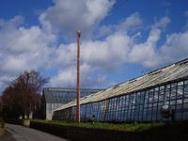

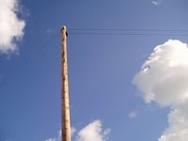
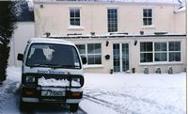
|
On call all weathers. I had chains on and was able to go everywhere. The bull bars were removed not long after this photo as they became illegal in Jersey. |

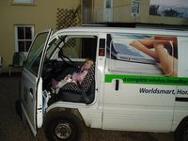
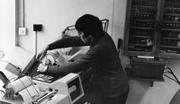
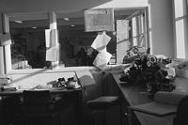
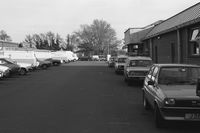
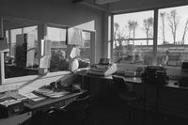
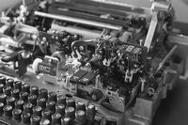
|
Jersey Telecom TEC ( Telecommunications engineering Centre) St Saviour Jersey in 1977. That’s my new Fiesta S in the picture. |
|
Working on a teleprinter 15 which BT called the 444. These electromechanical machines required specialist tools and skills. I repaired then on site at the customers most times. |
|
Myself in 1977 repairing an STC/ITT Perfector Telex machine in the Special Services workshop at TEC |
|
Part of the workshop 1n 1977 with a ITT teleprinter 2300 on test. |
|
A stripped electro mechanical teleprinter with the sound proof room for testing beyond the glass window. The later telex machines such as the Transtel Commaster 1 and 2 had four telex lines simultaneously connected and were quiet using floppy disks as storage (4.5” floppy discs). |
|
A special passenger in her papa’s telecoms van, apprentices seem to be getting younger these days. |
|
If you have any comments you would like to add about anything on this website please contact the website administrator.
maurice@troyfamily.co.uk |
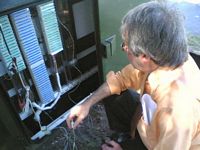
|
Me at work again fault finding on a data circuit. The new roadside “cabs” were much easier than the older types. |
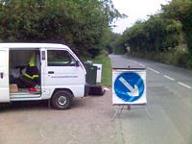
|
Two DSL’s gone down in St Lawrence putting a local business out of order. No Problem! |
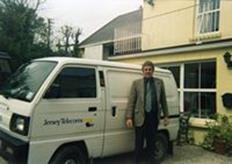
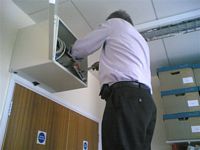
|
Me installing a new FBX HSDL & Modem 7A at Mothercare’s office in St Helier.2005 |
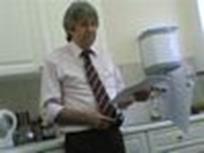
|
Me at work |
|
Sunday. Off on call out, all part of the job. |
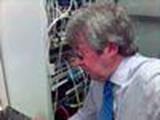
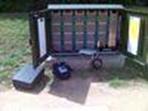
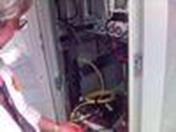
|
Here I am on a fault testing at Cab 7 at Sandybrook. |



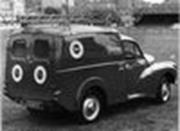
|
1966 States of Jersey telephone van. |
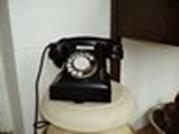
|
An old telephone No 332 which I have just restored to full working order. |
|
Working on Customers equipment at their premises. Me doing a 100Meg fibre test over our transceivers at Foreshore’s data Centre |
|
Still here after I put it up in 1974.(read right). |
|
Note:
My new troyfamily co.nz
web site has started . |
|
Moving with the times we see past technology like Telex’s gone, faxes dying out and now BT (British Telecom) to phase out ISDN ( Integrated Digital Service Network). What’s coming next is quite unimaginable. It’s all in the so called ‘cloud’ now!!! |
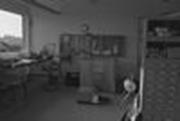
|
Above is the Special Services workshop 1978 with the unventilated Trichloroethylene (TCE) ultra sonic chemical bath which unknown to us for two years was very dangerous and had to be removed. It made us drowsy when in use and we learnt it could possibly have induced a heart attack etc.. |
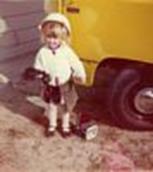
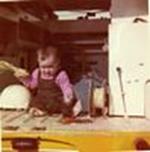
|
New engineers training 1975 Nicola and JJ in daddy’s telephone van. |
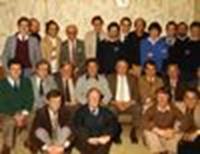
|
Some my colleagues in 1980. I’m in the blue jumper. |


|
Installing a fibre circuit |
|
Two of many favourite Telex machines I worked on., mostly at customers premises. The STC/ ITT 2300 and the 4 line Transtel Commaster 2 |
|
Doing a 100Meg data test at customers coms room |
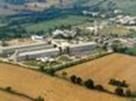
|
British Telecom Technical College, Howard Hall, Stone, Staffs. A place I knew well |

|
Setting up video conference unit with colleague Paul. |
|
The change over from 80+/80– to SCVF working of the telex network at customers premises resulted in an engineer instruction booklet written by management that was hilarious to read. We did not follow it and all went smoothly. I still have that booklet. |
|
Above. Checking on logged faults that are in. Below. Remote programming |